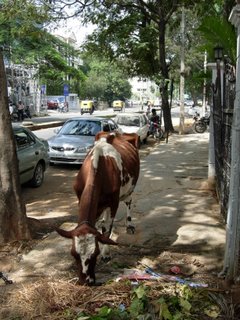Cows roam the streets, cause traffic jams and you often have to walk in the street because a cow is blocking the side walk
In Hinduism, the cow is considered sacred and its protection is a recurrent theme in which she is symbolic of abundance, of the sanctity of all life and of the earth that gives much while asking nothing in return. Most Hindus respect the cow as a matriarchal figure for her gentle qualities and providing nurturing milk and its products for a largely vegetarian diet. Hindus do not worship the cow, yet it holds an honoured place in society, and most Hindus do not eat beef.
- Indians consume milk on a daily basis, and the cow as a provider of milk, is equated to one's mother (hence the expression Gomäta = mother cow)
- Traditionally, Indians had cows in every household. They were part of the family, with names and personalities. Just like one would not hurt/eat their pets, the Indians did not hurt the cows and respected them.
- The cow has a special role in the Hindu mythologies; Kamadhenu is a wish-fulfilling cow. A cow is also depicted as vehicle of several deities.
- Many social reform movements in India (Jainism, Buddhism, the Bhakti Movement, Gandhi's non-violent movement) advocated non-violence, and no cruelty to animals. So in India, other animals also (like elephants, mice, monkeys) are considered holy.
- Traditionally, Indians had cows in every household. They were part of the family, with names and personalities. Just like one would not hurt/eat their pets, the Indians did not hurt the cows and respected them.
- The cow has a special role in the Hindu mythologies; Kamadhenu is a wish-fulfilling cow. A cow is also depicted as vehicle of several deities.
- Many social reform movements in India (Jainism, Buddhism, the Bhakti Movement, Gandhi's non-violent movement) advocated non-violence, and no cruelty to animals. So in India, other animals also (like elephants, mice, monkeys) are considered holy.
That said, many ethnic communities do eat beef in India. The cow meat is consumed by Roman Catholics, Anglo-Indians, and several other non-Brahmin Hindu communities.
Slaughter of the cows is banned in several states, as it is offensive to some Hindus.
Slaughter of the cows is banned in several states, as it is offensive to some Hindus.





No comments:
Post a Comment